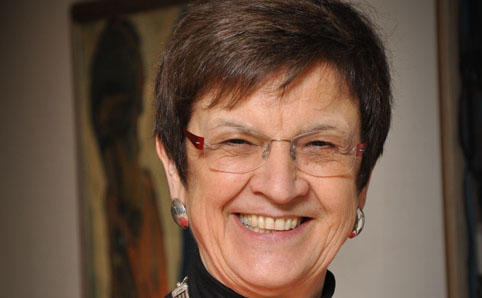 |
Prof. Maresi Nerad, from Washington university in Seattle, USA
Photo: Stephen Collett |
We are celebrating the launch of our new Postgraduate School (PGS) on our Main Campus in Bloemfontein from 16 - 20 May 2011.
In line with national priorities for research-based postgraduate education and the focus of the UFS Academic Turnaround Strategy, the aims of the Postgraduate School are to:
- improve the quality of postgraduate student research;
- produce graduates who are global citizens, research literate and able to reflect ethically on the purpose, process and product of research;
- improve throughput rates of postgraduate students; and
- make the experience of being a postgraduate at the UFS one which is stimulating, enjoyable and which contributes to the development of the person beyond the limits of her or his discipline(s).
“We hope that the school will be a pleasant place to pursue research scholarship, discuss ideas and relax, and we look forward to welcoming postgraduates and other scholars to the school,” Prof. Neil Roos, Director of the UFS Postgraduate School said.
This significant event in the academic transformation of the university goes hand in hand with the inaugural lecture of Prof. Maresi Nerad. Prof. Nerad’s impressive CV reads amongst others that she has a M.A. (Political Science) at the Technical University of Darmstadt, Germany and a Ph.D. (Higher Education) at the University of California, Berkeley. She is also the founding director of the national Center for Innovation and Research Graduate Education (CIRGE).
As Professor Extraordinary in the UFS’s Postgraduate School, she is bringing more to the table than a world of wisdom and her passion for the postgraduate education. “I can contribute lessons learned from four distinct professional experiences, including 17 years of administrative and scholarly leadership in undertaking the conceptual and practical transformational work of organisational change at two US postgraduate schools, where I worked amongst others to improve the quality of mentoring, shorten the time to doctoral degree, and improve doctoral completion rates.”
She also brings to the UFS her experience as founding and current director of the first research center for studies on graduate education in the world. “It is our mission to discover how best to prepare Ph.D. students to be effective leaders in research and society,” she said.
Prof. Nerad says that she is committed to support and consult with the UFS Postgraduate School. She would particularly encourage the use of research to understand postgraduate education in all its dimensions at the UFS better and to use the evidence-based findings as a base for policy-making and resource allocation.
In reflecting on her vision for the UFS Postgraduate School, Prof. Nerad says that five years from now she hopes to see the UFS having strengthened its position as a major driving force in the national South African postgraduate-education community for internationalising postgraduate education. She is also confident that the UFS will supply increased numbers of skilled postgraduates who are “intellectual entrepreneurs and risk takers with a social consciousness, who have sustainability of the systems of the planet as a core value”.
“Five years from now the PSG will have taken the lead in preparing graduate students who are world citizens,” Prof. Nerad concluded.
Presentation on PhD students reveals more than meets the eye
British professor presents a discussion at UFS
Journey from student to scholar
Society will take care of interests
Female academics talk about joys and lessons
Research plus the internet equals the cyber scholar